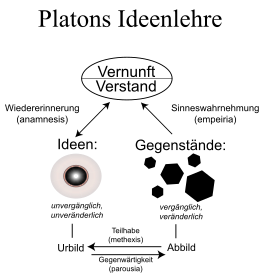Basic relation

The relationship between subject and object in the cognitive process a posteriori is called the basic relation . A distinction must be made between the psychophysical and the categorical basic relation.
Basic psychophysical relation
Kant already spoke of a physiology of the human mind (KrV A IX). The basic psychophysical relation refers to physical-physiological processes, especially those of sensory physiology , as Kant was familiar with based on the work of John Locke ( sensualism ). Psychophysical correlation is to be regarded as synonymous with the term psychophysical basic relation . The processes are necessary for the connection with the act of perception . They are therefore also decisive for raising awareness . The basic psychophysical relation brings the individual special characters to awareness, cf. Fig. 1.
Basic categorical relation
In addition to biological structures , the basic categorical relation also means cybernetic structures (psychological system). The basic categorical relation connects cognition and being categories . It brings the general character of the object (object) to consciousness, cf. Fig. 2. The development of such concepts is only conceivable through feedback within the psychic system, cf. see → situation circle and Fig. 3.
Working together
Both basic relations are connected in the psychophysical level , see Fig. 1 and Fig. 2. They are involved in the act of perception. Nicolai Hartmann says: “ Through the categorical basic relation we understand, but we do not know about existence; through the basic psychophysical relation we know about existence, but do not understand it. “This is reminiscent of the main principle of criticism : thoughts without content are empty, concepts without views are blind (Kant KrV B 75). Through the basic relation, the criticism holds the middle between rationalism and sensualism. Plato's theory of ideas already pointed to a cooperation between understanding and reason, cf. Fig 3.
Individual evidence
- ↑ a b c d e Schischkoff, Georgi (ed.): Philosophical dictionary. Alfred-Kröner, Stuttgart 14 1982, ISBN 3-520-01321-5 ; (ad) zu (Lexikon-Stw. Grundrelation , page 250; (e) zu Lexikon-Stw. Criticism , page 381 - (In contrast to the passage quoted in Kant, the main clause is reproduced as follows: Views without terms are blind, Terms without intuition are empty. )
- ↑ Hartmann, Nicolai : Basic features of a metaphysics of knowledge . De Gruyter, Berlin 4 1949

